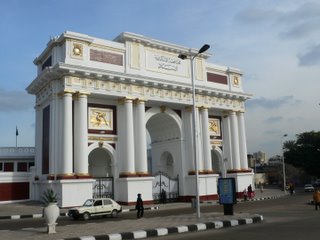
What makes visiting the African Nations Cup so fascinating is that element of unpredictably & drama that almost inevitably occurs both on and off the pitch.
Having been in Tunisia for the last such event prepares you for some aspects (although this time there were no Algerian supporters to 'enliven' the proceedings) and knowing Cairo is the biggest city in Africa should give you more clues.
But being an independent traveller essentially getting around like the locals means being part of an everyday mayhem characterised by jam-packed roads , crazy drivers with no road discipline, very few traffic lights (that actually work) & worn-out pedestrian crossings that nobody would risk using.
In general you see few other tourists (for instance using the metro system or the communal mini-buses) as most take the package tour option where you are generally shielded from the local miasma and can go from site to site often ring-fenced by security areas (of which there are many)
However you do interact with the local populace, initially with the taxi drivers (typically you know when you have got close to the 'correct' price for a trip when the driver is visibly grumpy - if he isn't you've probably paid too much) then the street hustlers hanging around the hotels (suggested tactic - smile and wave them, gently, away - any dialogue not recommended) & then finally the real people.
Most Egyptians are very friendly and welcoming , from the children practicing their limited English (what is your name, how are you) and offering you their biscuits, tea and chocolate (as one did at a game in Port Said) to the adults saying 'welcome to Egypt' and thrusting bread, cheese & inevitably, nuts into your hands. Generally they show a generosity of spirit to visitors that tends to make you (temporarily) forget the hustlers.
In such tournaments it makes a difference when the host nation does well.
In the first phase of the competition Egypt progressed , winning their group and thus ensuring full stadia for their games played at the 75,000 capacity Cairo International Stadium.
Throughout the event the home country showed a determination and resilience to succeed that eventually was to take them to the final.
But not without some drama along the way.
Taking centre stage was Tottenham striker Mido. He came to the African Nations Cup as a success in the English Premiership , regularly scoring goals for Spurs who thus gained Egyptian fans along the way. His performances for Egypt however had been not so great (I was told) and even though he scored in the first game he generally performed under par and was taken off against Morocco, despite which he still retained the support of the fans.
His finest (thespian) moment came in the semi-final versus Senegal when with some 15 mins to go , and with the score at 1-1, coach Hassan Shehata decided to substitute the tall striker(again he'd been playing moderately) Seeing his number being displayed Mido went through the full gamut from complete disbelief to a major argument with Shehata before finally trudging off. The guy who came on , Amr Zaki, then proceeded the head the winner with his first touch, thus fully vindicating the coach's decision.
Mido was later suspended for 6 months & played no part in the final (except as a very animated spectator)
Apart from the success of the home team the tournament tended to highlight the limitations of some of the World Cup qualifiers , especially Angola, Togo and Ghana.
Cameroon had the best player , in Samuel Eto'o, but ultimately they couldn't get past Drogba's Ivory Coast team with the star man himself missing the crucial penalty.
Crowd pleaser Jay Jay Okocha was to go out on a very low key note , in the irrelevant 3rd place game, but potential starlet Mikel (subject of a Chelsea/Man Utd bid) scored in one match then seem to run out of steam in another.
There were some spectacular goals and a few flare ups resulting in dismissals but with a generally high level of play and organisation that you have now come to expect from players of this continent.
As always the African supporters were colourful and vibrant. To be near such groups meant you couldn't help swaying to the rhythms.
Just one sour note caused some pause for thought when some Nigerian supporters took exception to a local man - at first I thought he had stolen something but it turned out he had taken a picture (without asking permission) of a Nigerian woman. Eventually the situation calmed down - but it highlights a cultural difference.
But overall being in the stadiums was a comfortable experience - it had to be as I watched 5 double headers and 17 games in total. The one exception being one game in Alexandria when the heavens opened and we were absolutely drenched for about 45 minutes. There being no cover - even under a policeman's shield.
Apart from the Cairo International Stadium the stadia were of a medium size with the crowds often heavily reinforced by military personnel dressed in guantanamo bay style outfits trucked in to fill up the otherwise empty seats. It was only at the Egypt games that they tended not be needed.
Obviously being non-Egyptian (and non-African) inevitably means you meet other Europeans , typically either in the stadiums or on the trains, and this time it was many Germans and other English - often groundhoppers. The opportunity to discuss your travels and experiences often filled many a long journey.
No comments:
Post a Comment